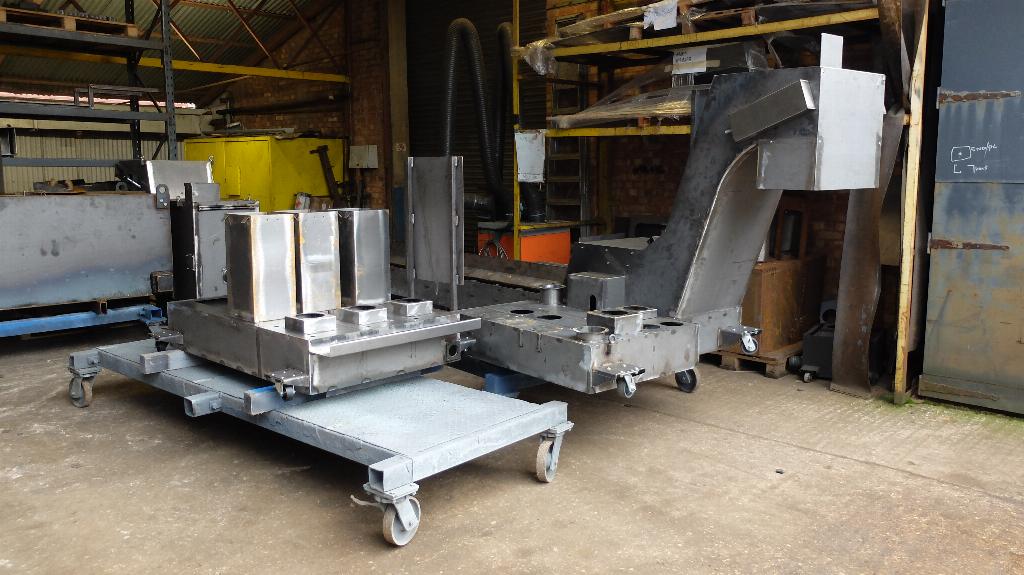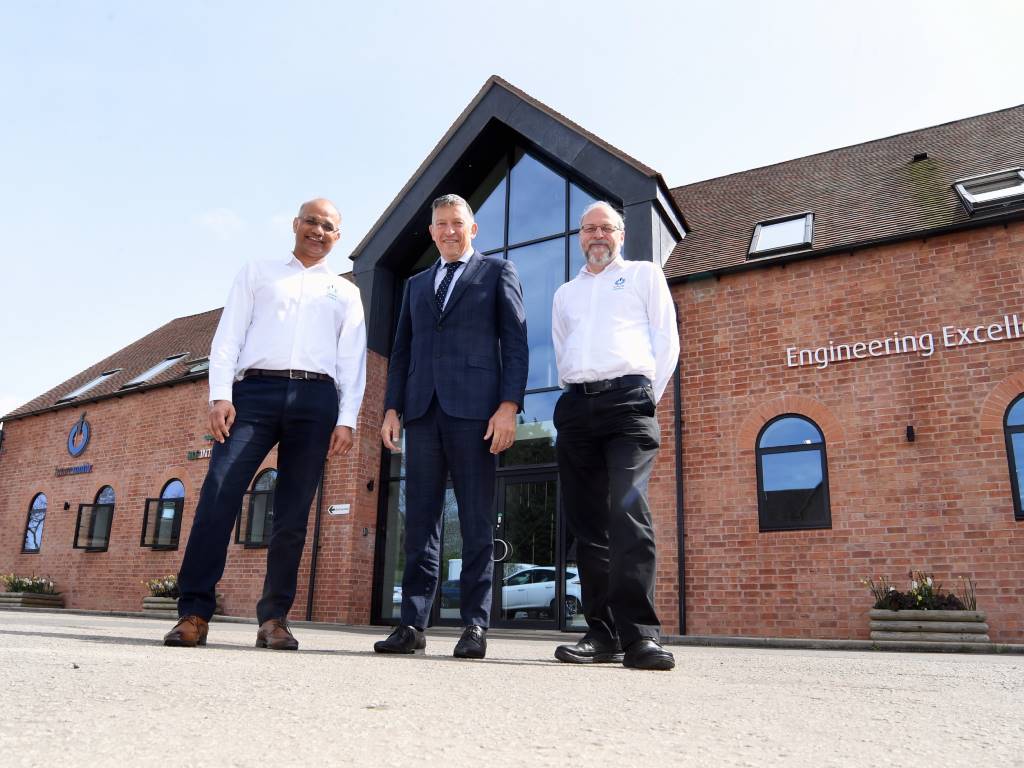Filtering tech for the age of automation

Ed Hill visited long-established chip and coolant specialist FSE (Filtration Service Engineering) in Kidderminster to hear about its latest technical advances and witness its extensive, in-house manufacturing capabilities.
Ed Hill visited long-established chip and coolant specialist FSE (Filtration Service Engineering) in Kidderminster to hear about its latest technical advances and witness its extensive, in-house manufacturing capabilities.
As a by-product of the machining process, chips, swarf and grinding particles are an everyday consequence that machine shops have to oversee to ensure regular ongoing production.
At one time, chip management and filtration of the cutting fluids that disperse them away from the cutting edge may have been considered of secondary importance to the business end of the machine tool producing components, however, in an age when production is increasingly becoming more automated, with lower staffed shopfloor environments and increased lights-out and 24/7 production, an efficient, reliable and high performing filtration system becomes ever more important.
When it comes to chip management and coolant systems, Kidderminster-based FSE (Filtration Service Engineering) has a history dating back to the 1950s of designing, manufacturing, installing and supporting these types of systems.
Now entering its third generation of family ownership, the 60 staffed company has built a strong reputation for making tailored systems that can be found on shopfloors working in tandem with machines, not only in the UK, but around the world.

Managing director Jay Roche comments: “As a manufacturer we operate from start to finish with our product range. We design systems, manufacture and fabricate them, paint them, fit the electronic interfaces required, and then install and support them for our customers.
“In the past chip and coolant management was rather neglected compared to the front end of the machine tool. The convention was historically just a case of emptying out the swarf bin at the end of the week or shift. Now, however, dealing with these issues has never been so critical. If chip and filtration systems don’t work efficiently or breakdown it brings a halt to all elements of production.
“Similarly, when it comes to ‘done-in-one style’ output or the machining of highly precise finished parts, such as those used in aerospace, you have to have coolant filtration processes that perform to the highest level to meet the specifications and certifications required.”
A processing partnership
FSE systems can be found installed with many of the most recognised machine tool brands. In fact, the company even paints its equipment to match the colour of some well-known marques.
FSE’s AD (Autodrum) media free systems are often installed as part of a turnkey solution for the machine tool end users. They can include swarf conveyors, pumps, separators and filtration systems with coolant clarification requirements in some cases as low as 1µm. Other equipment supplied can include automatic coolant top-up and monitoring systems, briquetting systems, coolant chillers and more.

In some circumstances systems may be linked to a number of machine tools in line or a manufacturing cell with shared chip and coolant management processes.
“Once the customer has been to a manufacturer or machine tool supplier and chosen a machine, we have to provide a chip management system that works in conjunction with it,” Mr Roche adds. “Machine tool and manufacturing technology is evolving all the time, so we have to design systems that keep pace with that, whether it’s more multi-axis and multi-process machine tools, automation and robotics, palletising, flexible manufacturing systems or smart factory applications.”
Pumped-up purification
It’s this need to constantly keep pace with the latest technical advances that enhance the machining process that has led FSE to start supplying a new range of filter pumps manufactured by Japanese manufacturer NOP.
These “unique” pumps, which are placed in the machine tool’s own standard supplied tank – which traditionally include manual rake out swarf baskets and filter screens – have their own integral self-cleaning ‘turbulence’ filter that separates chips and swarf from the coolant.
The major advantage is that coolant filtration systems no longer require additional equipment such as pre-filter tanks and pumps, in-line filters, and clean tanks before the coolant is sent to the high-pressure pump delivering the cleaned coolant to the cutting edge, either by through tool, or flood hose and nozzle systems.
“These pumps are the most innovative development I have seen in 30 years when it comes to coolant filtration,” Mr Roche affirms. “They do away with the need of secondary filtration systems which add additional cost and additional space to installations. They work without cartridge/consumable filters that have to be regularly changed, meaning maintenance is dramatically reduced, and they also use less power so they reduce ongoing energy costs.”
NOP pumps can be fitted to turning centres, horizontal machining centres and vertical machining centres. Initially FSE, as the UK and Europe agent for NOP, only supplied high pressure pumps which were used for through tool applications, but now NOP has developed three more flood pump systems that mean all types of coolant delivery can be employed with filter pumps.
“We can now supply pumps for overhead flooding, base flushing, around spindle flooding, through tool chip evacuation as well as wash guns,” Mr Roche explains. “These filter pumps ensure continuous, particle free coolant supply to all parts of the machine tool without the problematic issues of silt build-up, pump, hose and nozzle blockages and coolant contamination. It means increased production uptime, better cutting tool life and better surface finish on products.”
FSE is so confident about the benefits of NOP pumps, the company will be fitting them to all its future filtration systems as standard. However, the pumps can also be retrofitted to any machine tool’s tank so the company – which will also be promoting them at this year’s MACH – is encouraging all its customers, whether that’s machine tool suppliers or end users, to consider them as a major new benefit for machining production.

“NOP pumps are going to drive the industry and change the conventional perception and use of pumps. They reduce the footprint of chip management systems which is a very big factor for job shop owners who want to maximise their use of space. They provide more control and lower the initial cost of a turnkey filtration system, and they are they self-cleaning with no consumables,” Mr Roche asserts.
Approaching prospects
This new innovation in many ways represents the enthusiasm and expertise which, even after more than 50 years in business, FSE demonstrates when it comes to filtration and chip management.
“Our customers have increasingly complex requirements when it comes to chip management which is why we not only design, manufacture and install our systems but service them too, so we can guarantee their performance,” Mr Roche continues.
“The modern machining trend is to remove less metal and achieve better chip evacuation at the point of cut, so filtration in particular, has become of critical importance. That’s why I believe these new NOP filter pumps are such a gamechanger for the industry.”
And one fact that FSE can depend on is that whenever material is removed from a workpiece, chips, swarf or grindings will always be generated so systems have to be designed to manage them.
“The demand for the kind of systems we produce is driven by the needs of our customers in the industry. That’s why there has to be a degree of customisation for each one. This is also what we believe gives us the edge over our competitors,” Mr Roche says.
And this is also why Mr Roche believes FSE is in an ideal place to take on the machining and chip management challenges of the future as the company’s management is passed on to the next generation.
He concludes: “I am very optimistic about our prospects in the next five to ten years because as automation and other smart manufacturing technologies continue to grow, we will have to deliver smarter and ever more efficient systems that match them.”
FSE will be exhibiting at MACH 2020 in Hall 17, Stand 29 of the NEC.
Filtration Service Engineering www.fse.co.uk













